Episodes

Saturday Nov 18, 2017
Ep. 17: Triple A Blues (Developer Doldrums Part 3)
Saturday Nov 18, 2017
Saturday Nov 18, 2017
What does it mean to work in AAA game development? In the gaming community, the term "AAA" (pronounced “triple A”) comes with a lot of baggage. While at face value AAA is just an informal way to classify games and games studios that have the highest development and marketing budgets, the category also comes with negative conotations. You’d think more money meant less problems for game developers, right? Wrong! AAA studios are often seen as giant, painfully selfish corporations that care about one thing and one thing alone: money. From "lazy" to "immoral" and "untalented", game developers at AAA studios are often accused of having a myriad of moral failings, regardless of how much control they have over the final product.
Rachel Hammond, a ten-year veteran of the gaming industry, explains the big ol’ sad bits that are part of these big ol' games projects. From dealing with bad decisions made by top executives and being unable to respond directly to fans because of corporate gag orders, to emotionally coping with the vitriolic comments and death threats directed towards AAA studios (and the people that work there), Rachel has seen it all!
But it’s not all bad. Rachel’s love for programming video games (which started when she was 5 years old), hasn’t been squished by the pressures of the AAA space. Rachel, even after all this time, still loves her work in the games industry, even if the games industry doesn’t always love her back! Seriously. It's amazing. She genuinely loves making games that other people will love. Tune in to Episode 17 to learn about the issues that face AAA developers, and what we can do to help make the gaming community just a TEENSY WEENSY bit more empathetic.
Rachel Hammond has been making video games of all sizes for more than 10 years, and she still remembers the game review "Congratulations, you made a 6 year-old cry". She currently works in the AAA game space at a company that will inevitably be a poorly kept secret as the podcast goes on.
This episode is part three of the “Developer Doldrums” series, a collection of conversations with game developers about the not-so-happy bits that pop up when making play objects. For part one, check out Episode 15: Grief, Game Development, and the Emotional Significance of Oatmeal with Andrea Ayres of Lemonsucker Games to learn how the loss of a parent and an eating disorder (plus therapy) can lead to making a video game. Or, for something with a little less death, check out part two, "Episode 16: Long Distance Bromance" to hear from indie game studio Hydezeke on the pleasures and pains of being in a long distance game dev relationship. Oh, did I mention there's also a mini game in that episode? It's games, all the way down!
Stuff we mentioned...
AAA (video game industry)
Bratz
SpongeBob SquarePants
Transmedia storytelling
Ratatouille (video game)
Rats are very smart and gr8 at games
Sesame Street: Cookie’s Counting Carnival
Video Game Crash of 1983
The funniest joke in the world
Warren Spector and the Denius-Sams Gaming Academy
John Romero
Reddit thread: Game programmers: What game mechanic are you proud to have implemented?
Dunning-Kruger effect
SXSW Gaming 2018 Panel: IH8URGAME: Fostering Empathy in Gaming Communities
JD (The Broad)
Website: GamingBroadly.com
Twitter: @JayDeeCepticon
Instagram: @JayDeeCepticon
Rachel Hammond (The Cast)
Twitter: @xespera
Gaming Broad(cast) is the official podcast of GamingBroadly.com. Thank you to everyone who has liked, subscribed, and commented about Gaming Broad(cast) on Apple Podcasts! You can also follow this podcast on Spotify, Podbean, Stitcher, Google Music, or subscribe directly using our RSS feed. Want some gamey goodness in your email inbox? Sign up for some occasional(ly) playful newsletter updates. Thanks to Los Kurados for the use of their song "Rojo Y Azul" for the intro and outro music of our podcast.
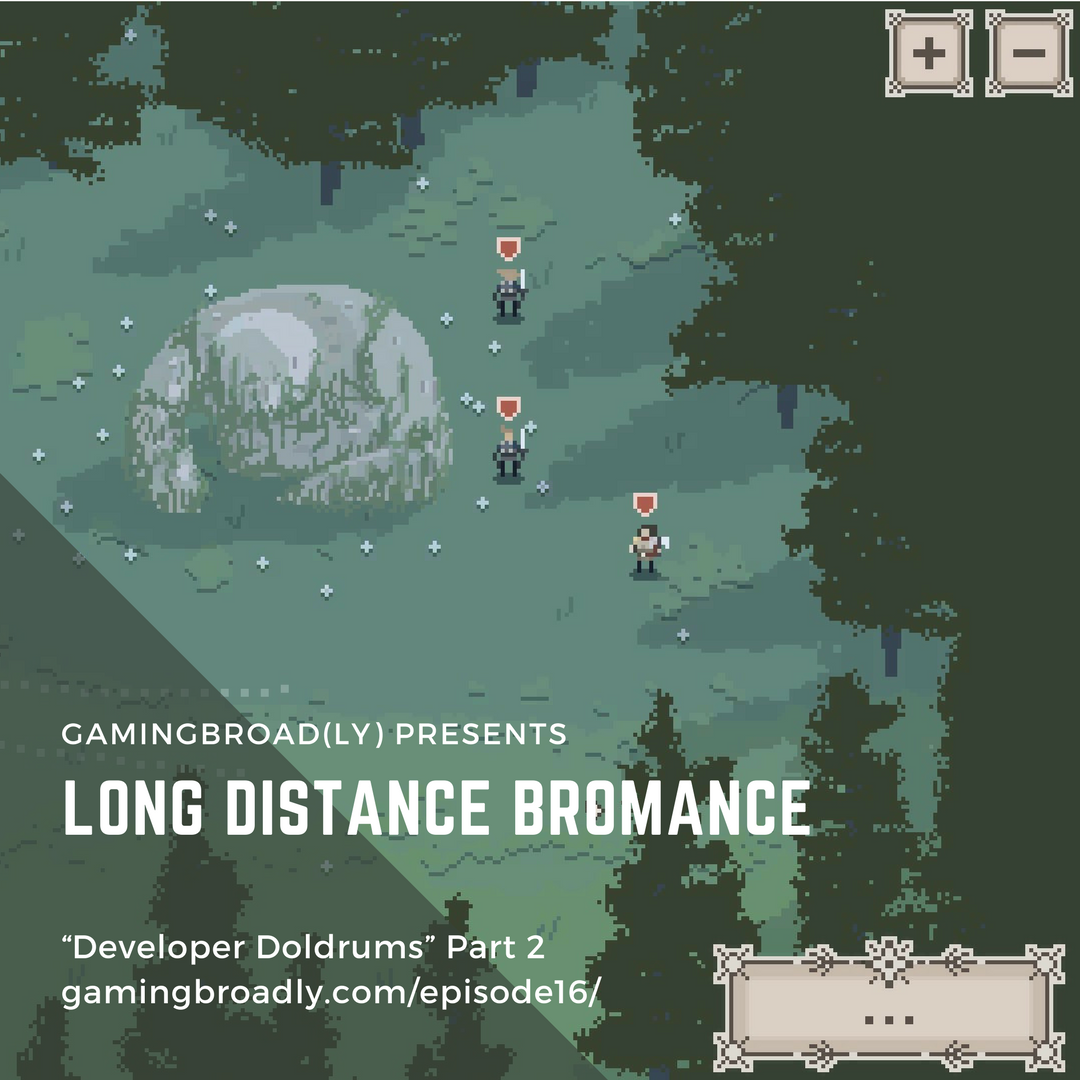
Saturday Nov 04, 2017
Ep. 16: Long Distance Bromance (Developer Doldrums Part 2)
Saturday Nov 04, 2017
Saturday Nov 04, 2017
Long distance relationships are enough to make anyone sad. Throw in making a game together? Even sadder! How do long distance game developers stay in the game? As hard as it is to build something together when you’re not, you know, actually together, Michael and Ben of Hydezeke are proof that with the right person (and for the right project), even distance can’t hold you back. Equal parts funny as it is emotionally honest, this episode gives hope to the idea that you can find a project partner to help you stay afloat in the sometimes turbulent waters of “creative collaboration”.
Michael Savage-Benoist [Benwa] is a game designer and dog enthusiast from Fairfax, Virginia. Ben Cohn is a music composer and banjo enthusiast from Orlando, Florida. What started out as a middle-school friendship has, 8 years later, became Hydezeke [Hide-zeek], an indie game studio.
Hydezeke is beset by the troubles of long-distance collaboration and conflicting life events, but Ben and Michael maintain their bond through their love for game design and bashing Sonic games. Flamberge, their flagship game still in development, was successfully Kickstarted (and accepted to Steam Greenlight, when that was still a thing) about three years ago. The extended development period is a bummer not only for the fans and supporters of Flamberge, but for Michael and Ben too. As tough as some of the comments are, Michael and Ben refuse to give up on their vision for the game’s future, and remain determined to deliver a good, quality game to the fans who have stuck with them all this time.
This episode is part two of the “Developer Doldrums” series, a collection of conversations with game developers about the not-so-happy bits that happen during the creation of these digital play objects. For part one, check out Episode 15: Grief, Game Development, and the Emotional Significance of Oatmeal with Andrea Ayres of Lemonsucker Games.
Stuff we mentioned...
Artemis Fowl
LACMA
Alphonse Mucha Princess Hyacinth
Magfest 2017 Awards
Flamberge Kickstarter
Flamberge on STEAM
Bumble Rumble by Ben Cohn (The Dating Game Music)
JD (The Broad)
Website: GamingBroadly.com
Twitter: @JayDeeCepticon
Instagram: @JayDeeCepticon
Hydezeke (The Cast)
Website: Hydezeke.com
Michael’s Twitter: @hydezeke
Ben’s Twitter: @bionicbenbo
Ben’s Soundcloud: bionicbenbo
Gaming Broad(cast) is the official podcast of GamingBroadly.com. Thank you to everyone who has liked, subscribed, and commented about Gaming Broad(cast) on Apple Podcasts! You can also follow this podcast on Spotify, Podbean, Stitcher, Google Music, or subscribe directly using our RSS feed. Want some gamey goodness in your email inbox? Sign up for some occasional(ly) playful newsletter updates. Thanks to Los Kurados for the use of their song "Rojo Y Azul" for the intro and outro music of our podcast.
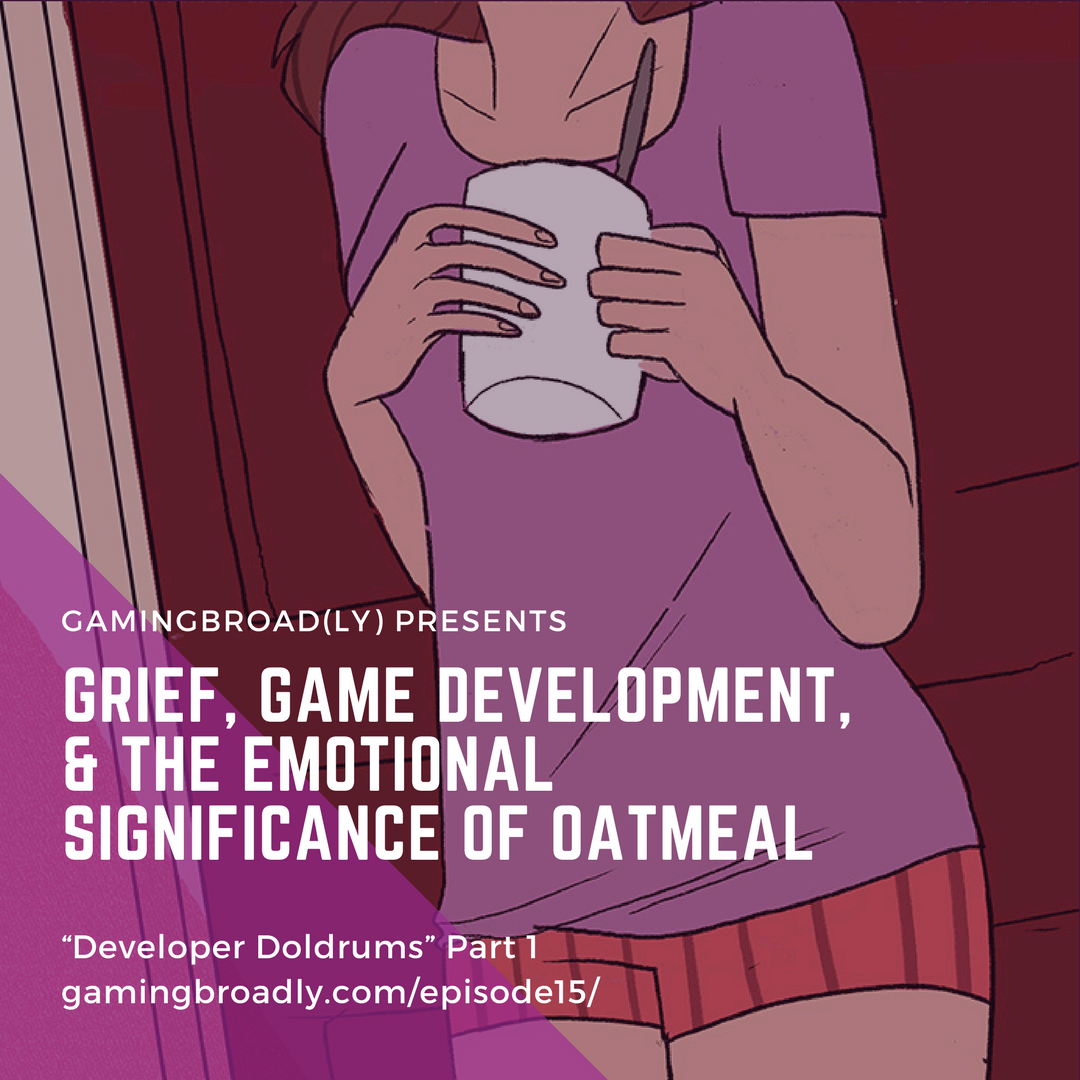
Thursday Oct 19, 2017
Thursday Oct 19, 2017
Andrea Ayres, creator of The Average Everyday Adventures of Samantha Browne, makes me feel a lot of things about hot cereal. The making of the Average Everyday Adventures of Samantha Browne shows that oatmeal has more to do with grief and game development than you might expect. Born on the heels of grief at the loss of a parent, and influenced by Andrea's personal experiences with social anxiety and an eating disorder, The Average Everyday Adventures of Samantha Browne is an interactive story about a painfully introverted college student who needs to make oatmeal in the communal kitchen of her dorm. While the game challenges you to find the right words to help Samantha as she embarks on her journey to the other side of her bedroom door, the development of the game itself challenged Andrea to explore her own relationship with mental health, anxiety, and loss.
This episode is part one of the “Developer Doldrums” series, a collection of conversations with game developers about the not-so-happy bits that hide behind the curtain of our digital play objects.
Andrea Ayres is a founder and the head writer at Lemonsucker Games. She also writes about politics and representation in pop-culture and beyond. She enjoys coffee, cats, and phasing between inter-dimensional realities.
Stuff we mentioned...
The Average Everyday Adventures of Samantha Browne
Eating Disorders
Social Anxiety
Schlesinger's Cat
Destiny 2
Journey
Brie Code on the concepts of "Tend-and-Befriend" and "Fight-or-Flight" in video games
Samantha Browne at Indiecade 2016
JD (The Broad)
Website: GamingBroadly.com
Twitter: @JayDeeCepticon
Instagram: @JayDeeCepticon
Andrea Ayres (The Cast)
Twitter: @missafayres
Instagram: @afad435
Website: Ayresdeets.com
Lemonsucker Games: lemonsuckergames.com
Gaming Broad(cast) is the official podcast of GamingBroadly.com. Thank you to everyone who has liked, subscribed, and commented about Gaming Broad(cast) on Apple Podcasts! You can also follow this podcast on Spotify, Podbean, Stitcher, Google Music, or subscribe directly using our RSS feed. Want some gamey goodness in your email inbox? Sign up for some occasional(ly) playful newsletter updates. Thanks to Los Kurados for the use of their song "Rojo Y Azul" for the intro and outro music of our podcast.
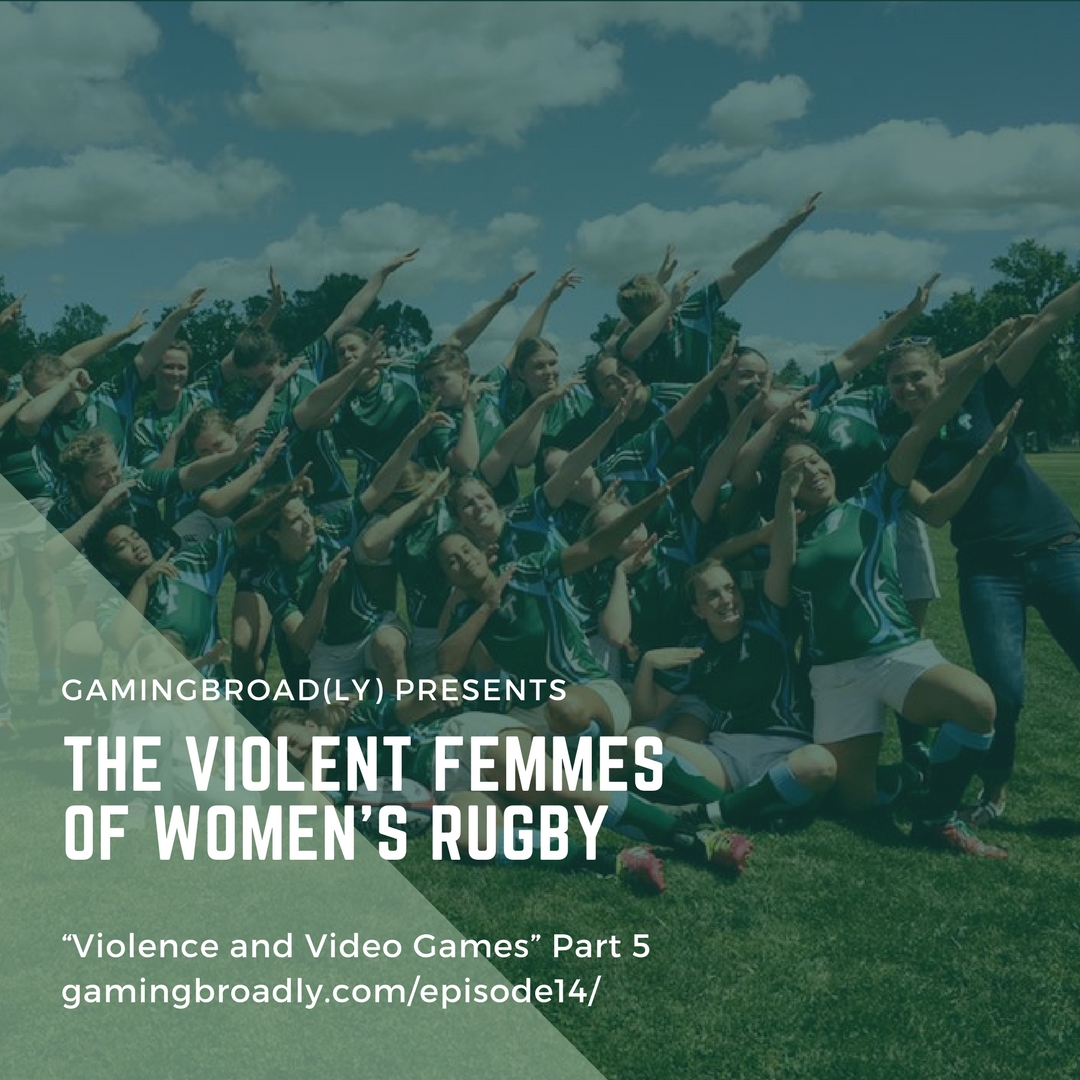
Thursday Oct 05, 2017
Ep. 14: The Violent Femmes of Women's Rugby (Violence & Video Games Part 5)
Thursday Oct 05, 2017
Thursday Oct 05, 2017
There’s a lot of assumptions folks make about violence and video games, from beliefs that violence in video games cause real life violent crime, to the stereotype that violence in video games is intended only for our more dudely players. But what about the violence that happens in real life sports? Does tackling and dragging someone to the ground for a ball make you more likely to tackle and drag someone to the ground out in the real world? And do women really like all that brutal physicality anyways?
As far as brutality goes, the sport of rugby is about as brutal as they come. Sometimes it hurts to watch rugby, much less play it. Legend has it that rugby was invented in England in 1823, when William Webb Ellis decided the rules of soccer (“football”) didn’t apply to him, picked up the ball with his hands, and ran the length of the pitch to score the first ever try. The Tulane Women’s Rugby Team follows in this great rugby tradition of smashing expectations, and are currently ranked third in the country after only two years of competitive play. This week we're joined by members of Tulane University's Women's Rugby Team, Emma Peterson and Hayley Alexander. Emma and Hayley want folks to know that there's more than meets the eye when it comes to the "violence" in rugby, and that the respect and comraderie of rugby is actually the selling point of the sport... not the bruises and the black eyes (however fetching they can be).
Unfortunately, Hayley and Emma have found that rugby isn’t always thought of as a “women’s sport”, mostly due to assumptions about what genders are interested in physically brutal gameplay. And when people DO think of women rugby players, they often assume the women are all hyper-masculine drunken lesbians who are into bar fights. While there undoubtedly are rugby women who fall into those categories ("shoot the boot" is a real and terrifying thing, apparently), Hayley and Emma discuss some of the stereotype-shattering aspects of the women’s rugby community, from teams filled to the brim with sorority girls, to winning kicking competitions at rugby tournaments in pencil skirts.
Emma Peterson, originally from Northern California, is a graduate student at Tulane University, getting her M.A. in English. She plays for Tulane Women's Rugby Club.Stuff we mentioned...
How to Play Rugby
Tulane University
Rugby Ball
Moon Walking
Shoot the Boot
JD (The Broad)
Website: GamingBroadly.com
Twitter: @JayDeeCepticon
Instagram: @JayDeeCepticon
Tulane Women's Rugby Club (The Cast)
Facebook: TulaneUWRFC
Instagram: @Tulanewrfc
Website: www.tulanewrfc.wixsite.com/tuwrfc
Gaming Broad(cast) is the official podcast of GamingBroadly.com. Thank you to everyone who has liked, subscribed, and commented about Gaming Broad(cast) on Apple Podcasts! You can also follow this podcast on Spotify, Podbean, Stitcher, Google Music, or subscribe directly using our RSS feed. Want some gamey goodness in your email inbox? Sign up for some occasional(ly) playful newsletter updates. Thanks to Los Kurados for the use of their song "Rojo Y Azul" for the intro and outro music of our podcast.
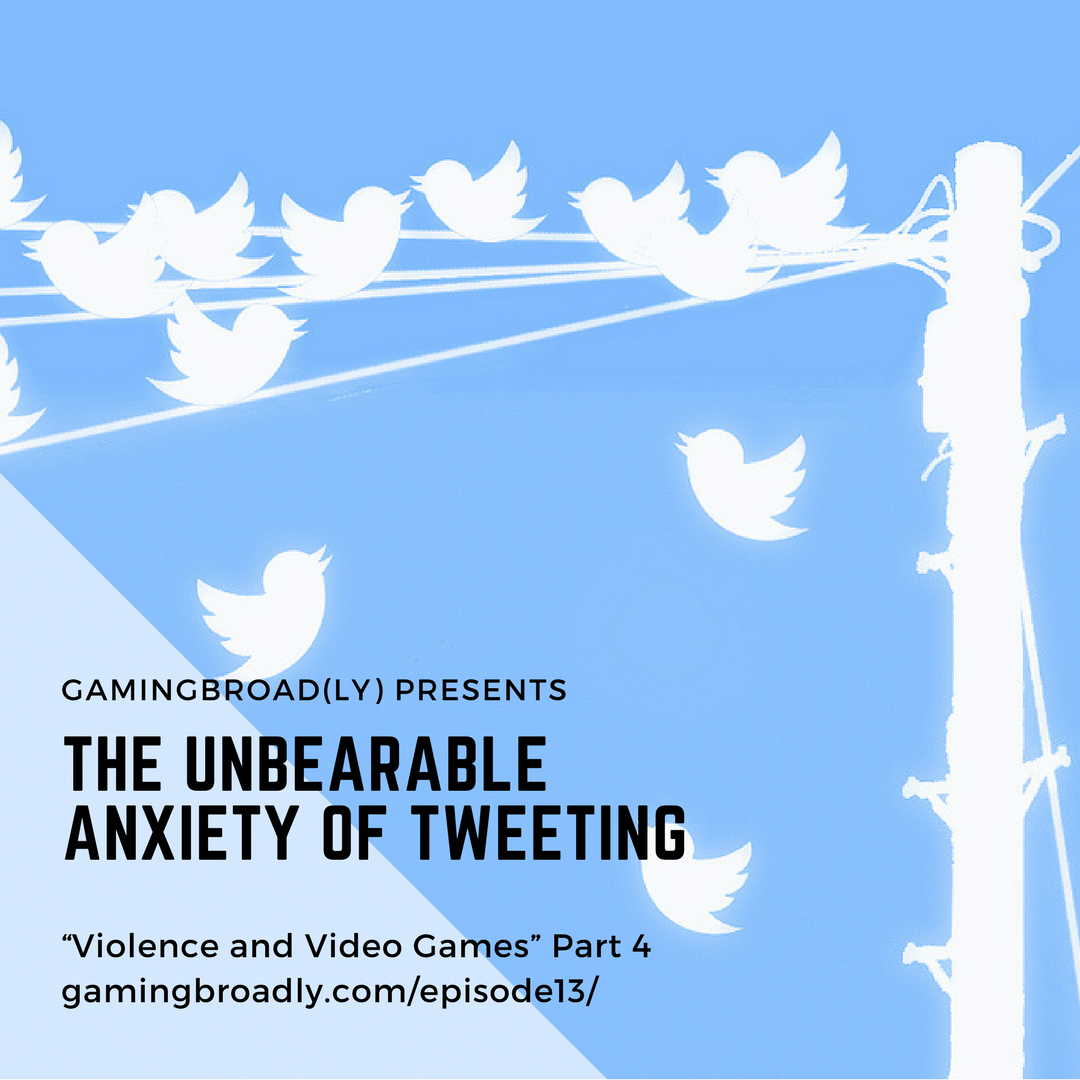
Wednesday Sep 20, 2017
Ep. 13: The Unbearable Anxiety of Tweeting (Violence & Video Games Part 4)
Wednesday Sep 20, 2017
Wednesday Sep 20, 2017
Subtweeting is all the rage these days. And no, we don't mean tweeting from a Subway. Rae Sterling, writer and twitter role-player, joins us this week to talk about how (and why) passive-aggressiveness crops up in online gaming spaces. Join us this week to learn more about Twitter roleplay, the benefit and detriment of anonymity on the internet, and the toxic effects of passive-aggression on community-building.
While the anonymity of the internet is what has allowed Rae to really delve deep into the cathartic (and often therapeutic) world of role-play, Rae thinks that anonymity also makes space for people to dredge up the worst part of themselves in the form of trolling, pile-ons, and emotional abuse. Subtweeting and vaguebooking is a way that a lot of folks deal with the fear of internet aggression, but these indirect forms of communication wind up creating toxic play spaces. Subtweeting, indirectly tweeting something about someone without mentioning their name (even though it's KIND OF clear who the person tweeting is referring to), can have surprisingly devastating effects on individuals and communities. Add in an anxiety disorder? The effects become ten-fold!
This episode is part four in Gaming Broad(ly)'s series on violence and video games. Continuing from previous conversations, this week we look at how just the FEAR of violence in online gaming spaces causes ripple effects that impact even our conversations and interpersonal relationships. For the full conversation, start with “Episode 10: Moral Combat—Why the War on Violent Video Games is Wrong” with researchers Chris Ferguson and Patrick Markey on the (lack of) data about video games causing real life acts of violence, followed by “Episode 11: Why Are You So Angry?”, with Ian Danskin of Innuendo Studios, to learn more about why folks get so, well, aggressive about making sure games stay violent. Part three will bring you to "Episode 12: Why Are You Afraid of Virtual Reality?" with Gijs Molsbergen for a discussion on virtual reality, violence and trauma, and the responsibility of VR advocates to make psychologically healthy and enjoyable VR experiences.
Rae Sterling (they/them) is a gender adjacent in-progress writer of both comics and prose based in Austin, Texas. In their spare time, they work full time at Austin Books and Comics and at reading more than your daily suggested serving of comics to keep up with the ever-moving world. They participate in online role-playing on Twitter and Tumblr, play Overwatch, and describe themselves as "bad at video games". Their passions include speaking loudly and to whomever will listen about both LGBT+ comic books, diversity in comics, and the importance of all-ages comics in the lives of young readers. In Austin, Rae is working hard to become a source of information to both schools and parents for all-ages graphic novels and comic books.
Stuff we mentioned...
Slime Rancher
Dream Daddy
Overwatch
Fighting Games (like Moral Combat, Tekken, etc.)
Twitter Roleplay
Tumblr Roleplay
Shadow Banning
Vaguebooking
Subtweeting
Passive-aggressive behavior
JD (The Broad)
Website: GamingBroadly.com
Twitter: @JayDeeCepticon
Instagram: @JayDeeCepticon
Rae Stirling (The Cast)
Twitter: @dragonosaurus
Website: Genretastic.com
Gaming Broad(cast) is the official podcast of GamingBroadly.com. Thank you to everyone who has liked, subscribed, and commented about Gaming Broad(cast) on Apple Podcasts! You can also follow this podcast on Spotify, Podbean, Stitcher, Google Music, or subscribe directly using our RSS feed. Want some gamey goodness in your email inbox? Sign up for some occasional(ly) playful newsletter updates. Thanks to Los Kurados for the use of their song "Rojo Y Azul" for the intro and outro music of our podcast.
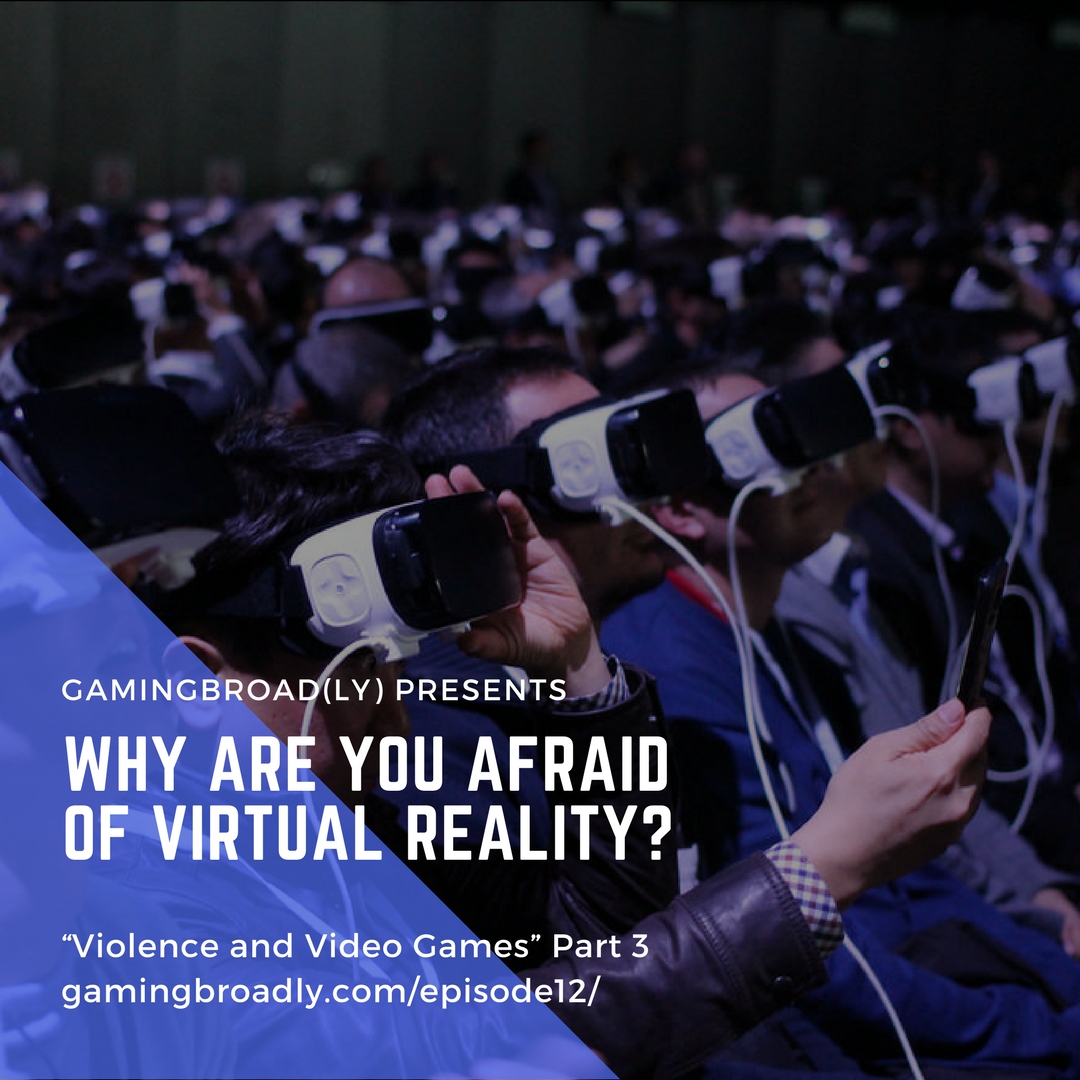
Tuesday Sep 05, 2017
Tuesday Sep 05, 2017
The next frontier of video game development is the virtual one, and research about the impact of violence in Virtual Realiy (VR) has started to gear up (if Dr. Chris Ferguson of Episode 10 is any indication). This week JD continues the conversation about violence in video games by chatting about violence and VR with Gijs Molsbergen, a virtual reality gamer with experience developing an award winning VR experience. Gijs is a VR advocate, and has been awed and inspired by the experience and potential of virtual reality for quite a while.
But loving something also means acknowledging how powerful it can be, and Gijs admits there could be some unintended negative effects of VR if developers and VR advocates don’t take their role as VR ambassadors seriously.
While Gijs thinks violence in VR is extremely unlikely to cause acts of violence in real life, there is the potential for virtual reality to be traumatic for folks who aren’t fully prepared for just how real VR can feel. Gijs has some suggestions to help make the mental transition from physical to virtual a good one, from physical grounding techniques and proper mental preparation, to thinking ahead about designing experiences that mitigate the effects of harassment in virtual spaces.
The episode culminates with Gijs talking about his work with the National Video Game Museum in the Netherlands (opening October 2017), which will include a Virtual Reality exhibit and game research lab. Gaming Broad(ly) field trip to the Netherlands, anyone?
This episode is part three in Gaming Broad(ly)'s series on violence and video games. For the full conversation, start with “Episode 10: Moral Combat—Why the War on Violent Video Games is Wrong” with researchers Chris Ferguson and Patrick Markey on the (lack of) data about video games causing real life acts of violence, followed by “Episode 11: Why Are You So Angry?”, with Ian Danskin of Innuendo Studios, to learn more about why folks get so, well, aggressive about making sure games stay violent.
Gijs Molsbergen is a Virtual Reality gamer and content marketing consultant in the Netherlands, with experience developing an award winning VR experience.
Stuff we mentioned...
Lab4242
SpaceLAB (Category Management VR App for retailers) by Lab4242
VTime
PaintLab by Lab4242
“Making virtual reality matter” TEDxYouth Talk by Gijs Molsbergen
Man’s reaction to rollercoaster VR prank
Resident Evil 7: Biohazard (example of a VR horror game)
JD (The Broad)
Website: GamingBroadly.com
Twitter: @JayDeeCepticon
Instagram: @JayDeeCepticon
Gijs Molsbergern (The Cast)
Twitter: @Gijs_Molsbergen
Work: OrangeValley.nl
Website: GijsMolsbergen.nl
Email: ghf.molsbergen@gmail.com
Gaming Broad(cast) is the official podcast of GamingBroadly.com. Thank you to everyone who has liked, subscribed, and commented about Gaming Broad(cast) on Apple Podcasts! You can also follow this podcast on Spotify, Podbean, Stitcher, Google Music, or subscribe directly using our RSS feed. Want some gamey goodness in your email inbox? Sign up for some occasional(ly) playful newsletter updates. Thanks to Los Kurados for the use of their song "Rojo Y Azul" for the intro and outro music of our podcast.
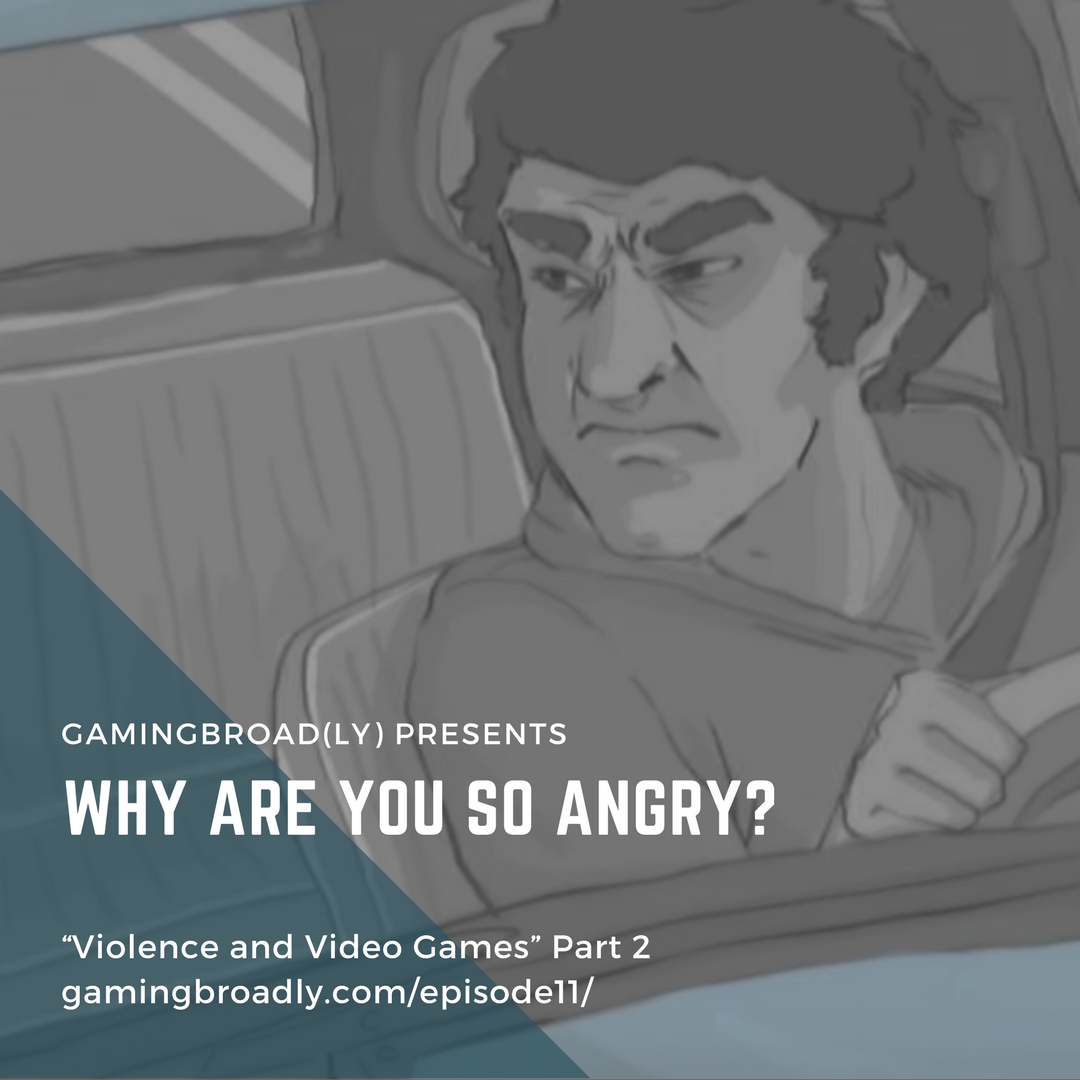
Tuesday Aug 22, 2017
Ep. 11: Why Are You So Angry? (Violence & Video Games Part 2)
Tuesday Aug 22, 2017
Tuesday Aug 22, 2017
Ian Danskin of Innuendo Studios joins JD this week to talk the WHY of violence. Specifically, why does violence matter so much to so many people who play games? Ian explores why the mission to keep violence in video games feels so personal to so many people, and why conversations about the cultural implications of violence in video games get so heated. A particularly relevant conversation, seeing as the past few years have seen a flurry of intense (and somewhat scary) responses to critiques of the ubiquity of violence in video games (Gamergate and the harassment directed towards Anita Sarkeesian being notable examples).
For Ian, regardless of how we think the violence affects us, there is the question of what the violence is used to sell and who it’s supposed to sell itself to. Tune in this week to learn about the ripple effects of censorship attempts, the gendered nature of marketing, and how the perceived naughtiness of violence in video games can affect our emotional attachment to these digital playscapes.
Ian Danskin is a New England media artist and video essayist. He makes videos about games and web culture on his YouTube channel, Innuendo Studios.
This episode is the second in a current mini series on violence and video games. For the first episode in the series, check out Episode 10: Moral Combat--Why the War on Violent Video Games is Wrong.
Stuff we mentioned...
Moral Combat: Why the War on Violent Video Games is Wrong
90s Censorship Wars
Jack Thompson
Anita Sarkeesian and Feminist Frequency
Gamergate
DOOM: Bethesda E3 Showcase Gameplay Reveal
“Blood is Compulsory” video by Ian Danskin
Mortal Combat Blood Code
Supreme Court ruling on video games being art
Nancy Drew Games
"No Girls Allowed" Polygon Article on the relationship between stereotypes that "video games are for boys" and marketing
Dear Esther
What Remains of Edith Finch
Myst
Walking Simulators
Casual Games (and "Casual Revolution" by Jesper Juul, just for kicks)
Sonic the Hedgehog is so mean
Play it Loud Campaign
“Will thoust get the girl? Or play like one?”
Part 1 of Ian’s “Why Are You So Angry?” Series (part 2 gets to "bubble popping")
D.A.R.E.
The Sims
JD (The Broad)
Website: GamingBroadly.com
Twitter: @JayDeeCepticon
Instagram: @JayDeeCepticon
Ian Danskin (The Cast)
Twitter: @InnuendoStudios
Youtube Channel: Innuendo Studios
Patreon: Innuendo Studios
Tumblr: InnuendoStudios
Gaming Broad(cast) is the official podcast of GamingBroadly.com. Thank you to everyone who has liked, subscribed, and commented about Gaming Broad(cast) on Apple Podcasts! You can also follow this podcast on Spotify, Podbean, Stitcher, Google Music, or subscribe directly using our RSS feed. Want some gamey goodness in your email inbox? Sign up for some occasional(ly) playful newsletter updates. Thanks to Los Kurados for the use of their song "Rojo Y Azul" for the intro and outro music of our podcast.
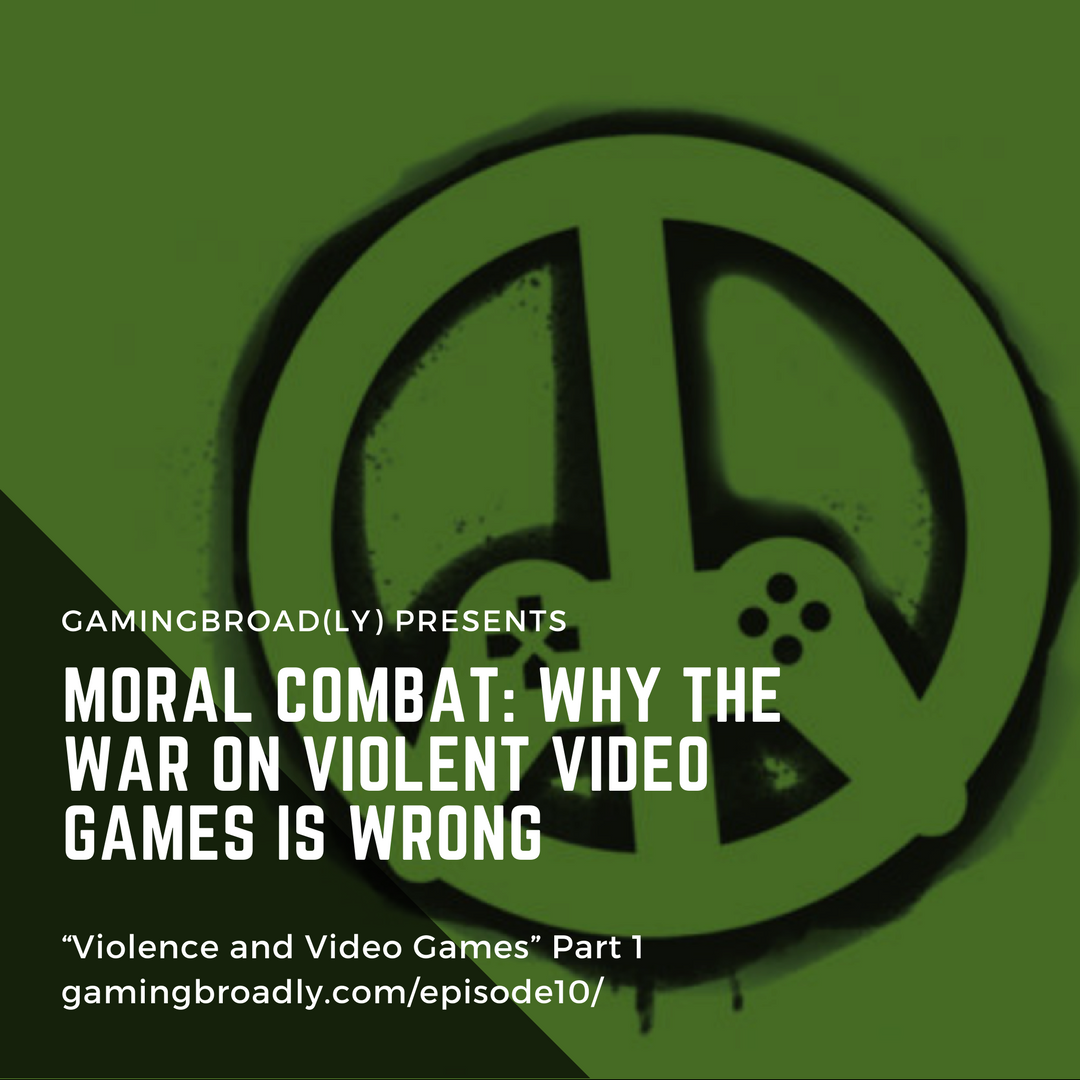
Wednesday Aug 09, 2017
Wednesday Aug 09, 2017
In a time of nation-wide unrest and division, it's surprising to hear that politicians from both sides of the aisle are united on one thing: violent video games are bad and must be stopped. Blamed for everything from school shootings, suicide, and even rickets, video games have been shouldering the burden for our society’s ills for a long time now (or, at the very least, ever since comic books and ozzy osbourne have taken a back seat as the source of all evil).
Politicians, pundits, and even psychologists, are quick to point a finger at the guns in video games in order to make sense of the guns in the hands of real life people, especially when those guns are in the hands of school shooters. But is playing too much Call of Duty really causing killing sprees?
Christopher Ferguson and Patrick Markey are two psychology experts who have been on the front line of the violent video game debate for years. Their new book, Moral Combat: Why the War on Violent Video Games is Wrong, debunks the stark picture media, politicians, and other personalities tend to paint in order to sway public opinion about the impact of gaming. In this episode, with complete honesty and extensive research, the informative (and often entertaining) Ferguson and Markey duo lays the data out on the table to reframe the conversation on the real life effects of gaming.
Patrick M. Markey is a professor of psychology, the director of the Interpersonal Research Laboratory at Villanova University, and a former president of the Society for Interpersonal Theory and Research. Markey received his doctorate from the University of California.
Chris Ferguson is professor of psychology and director of the Psychotechnology Lab at Stetson University as well as a fellow of the American Psychological Association. He has a doctorate in clinical psychology from the University of Central Florida.
This episode kicks off Gaming Broad(cast)'s new mini series exploring the relationship between violence and video games.
Stuff we mentioned...
Moral Combat: Why the War on Violent Video Games is Wrong
American Psychological Association
APA Review in 2015 Confirms Link Between Playing Violent Video Games and Aggression
Hillary Clinton on video game violence (comparing it to lung cancer)
James Dallas Egbert III (Michigan State University student whose suicide was blamed on Dungeons & Dragons)
Mazes and Monsters with Tom Hanks
Assassin’s Creed 4
The families of Columbine victims sue the makers of DOOM, blaming them for tragedy
Leland Yee (politician against violent video games, later charged with real life arms trafficking)
Proof that Chris really did meet with Former Vice President Joe Biden and talked about video games
Hilary Clinton, Bernie Sanders, and Donald Trump on the same page when it comes to games
Games for Change
Transfer of Learning
The Oregon Trail (video game)
JD (The Broad)
Website: GamingBroadly.com
Twitter: @JayDeeCepticon
Instagram: @JayDeeCepticon
Patrick M. Markey, PhD (The Cast)
Website:PatrickMarkey.com
Twitter:@PatMarkey
Christopher J. Ferguson, PhD (The Cast)
Website: ChristopherJFerguson.com
Twitter: @CJFerguson1111
Gaming Broad(cast) is the official podcast of GamingBroadly.com. Thank you to everyone who has liked, subscribed, and commented about Gaming Broad(cast) on Apple Podcasts! You can also follow this podcast on Spotify, Podbean, Stitcher, Google Music, or subscribe directly using our RSS feed. Want some gamey goodness in your email inbox? Sign up for some occasional(ly) playful newsletter updates. Thanks to Los Kurados for the use of their song "Rojo Y Azul" for the intro and outro music of our podcast.
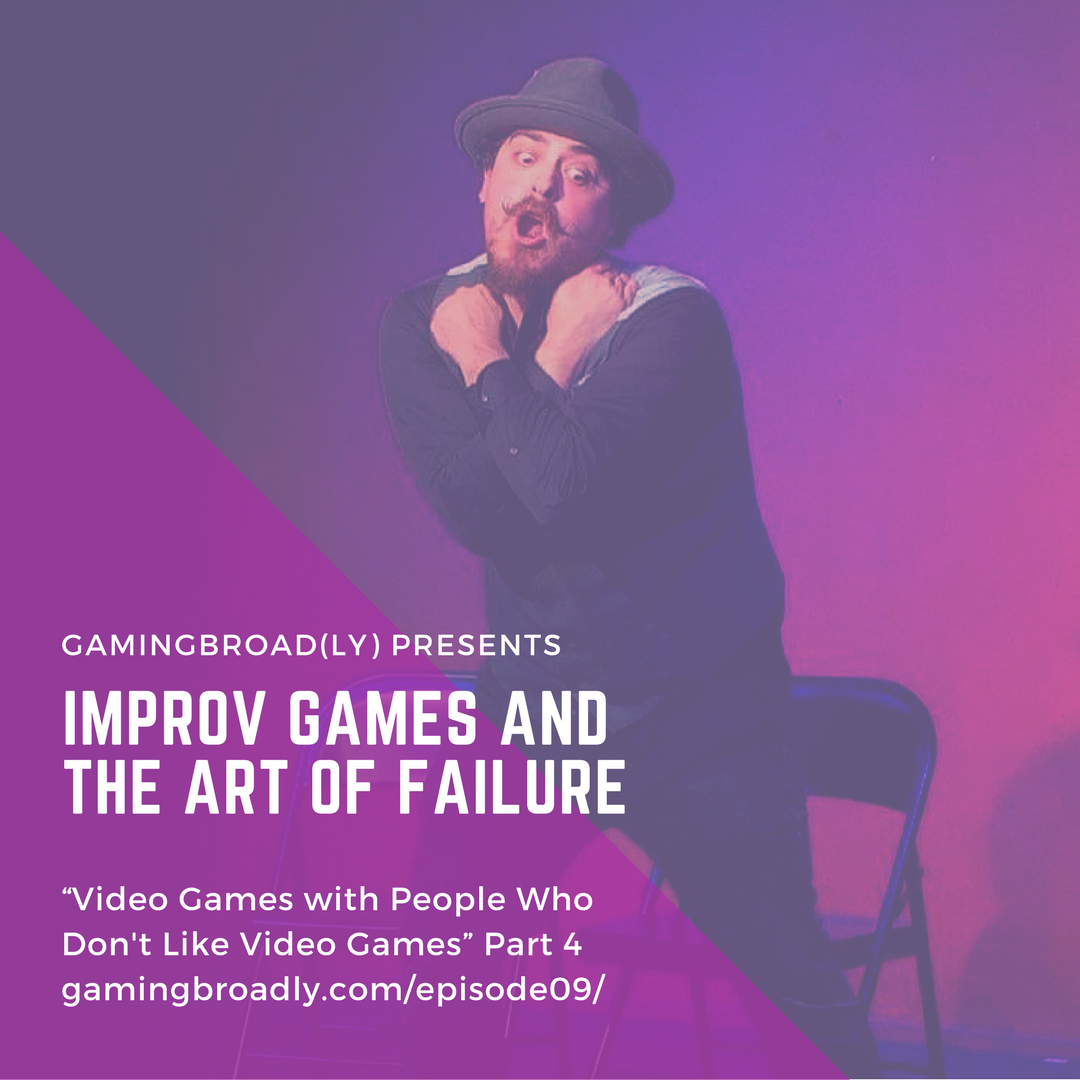
Tuesday Jul 25, 2017
Tuesday Jul 25, 2017
Tune in to witness something that some might say is impossible… the changing of one man’s heart. This week JD interviews Jeremy Moran, a filmmaker, artist, and improv actor, whose consistent failure in the gaming arena USED to mean he disliked playing them all together. In Episode 09: Improv Games and the Art of Failure with Jeremy Moran, we'll learn more about failure, the tyranny of rules, improv games, and ways to find the art in everything. Even a door!
Jeremy historically has been pretty bad at games, and the consistent number of losses he experienced while gaming was a real turn off. But something's changed recently. While it’s been said that video games are “the singular art form that sets us up for failure and allows us to experience it and experiment with it”, another fail-friendly art form also exists: the art of improv theater. His experience with improv over the last four years, including improv games, has increased not only his tolerance for playfulness and failure, but his enjoyment as well!
This is the fourth (and final!) episode in a series of interviews about video games with people who don't like playing video games, inspired by Brie Code and a panel from SXSW (titled "Video Games for People Who Don't Like Video Games"). See Episode 06: Crying in a Closet, an interview with non-gamer Bailey Morrison about games and anxiety, for part one in the series, Episode 07: The Pleasures of Back-seat Gaming with game spectator and eSports lover Nora Green for part two, and part three, Episode 08: Learning the Language of Rules Vs. Creativity with Lisa P., for a rousing discussion on how gaming can help in the classroom (while still being hecka boring as a personal pastime).
Stuff we mentioned...
Munchkins
Grandtheft Auto
Sandbox Games
Bioshock
The Game (film)
Bart's Nightmare
90s animation
Cuphead
Machinarium
Improv
Hideout Theater in Austin, TX
Whoosh Bang Pow (improv warmup game)
Bippity Bippity Bop (improv warmup game)
"Finding the game"
Gaming Broad(cast) Episode 08 with Lisa P. (in reference to disliking failure and rules)
Roger Ebert saying "video games can never be art" (followed by saying okay yeah they can)
Rythm 0 by Marina Abramović
Gaming Broad(cast) Episode 07 with Nora (in reference to stereotype threat and the gaming community)
JD (The Broad)
Website: GamingBroadly.com
Twitter: @JayDeeCepticon
Instagram: @JayDeeCepticon
Jeremy Moran (The Cast)
Instagram: @ModernistMuffin
Twitter: @MoranicJeremy
Vimeo: @JeremyMoran
Gaming Broad(cast) is the official podcast of GamingBroadly.com. Thank you to everyone who has liked, subscribed, and commented about Gaming Broad(cast) on Apple Podcasts! You can also follow this podcast on Spotify, Podbean, Stitcher, Google Music, or subscribe directly using our RSS feed. Want some gamey goodness in your email inbox? Sign up for some occasional(ly) playful newsletter updates. Thanks to Los Kurados for the use of their song "Rojo Y Azul" for the intro and outro music of our podcast.
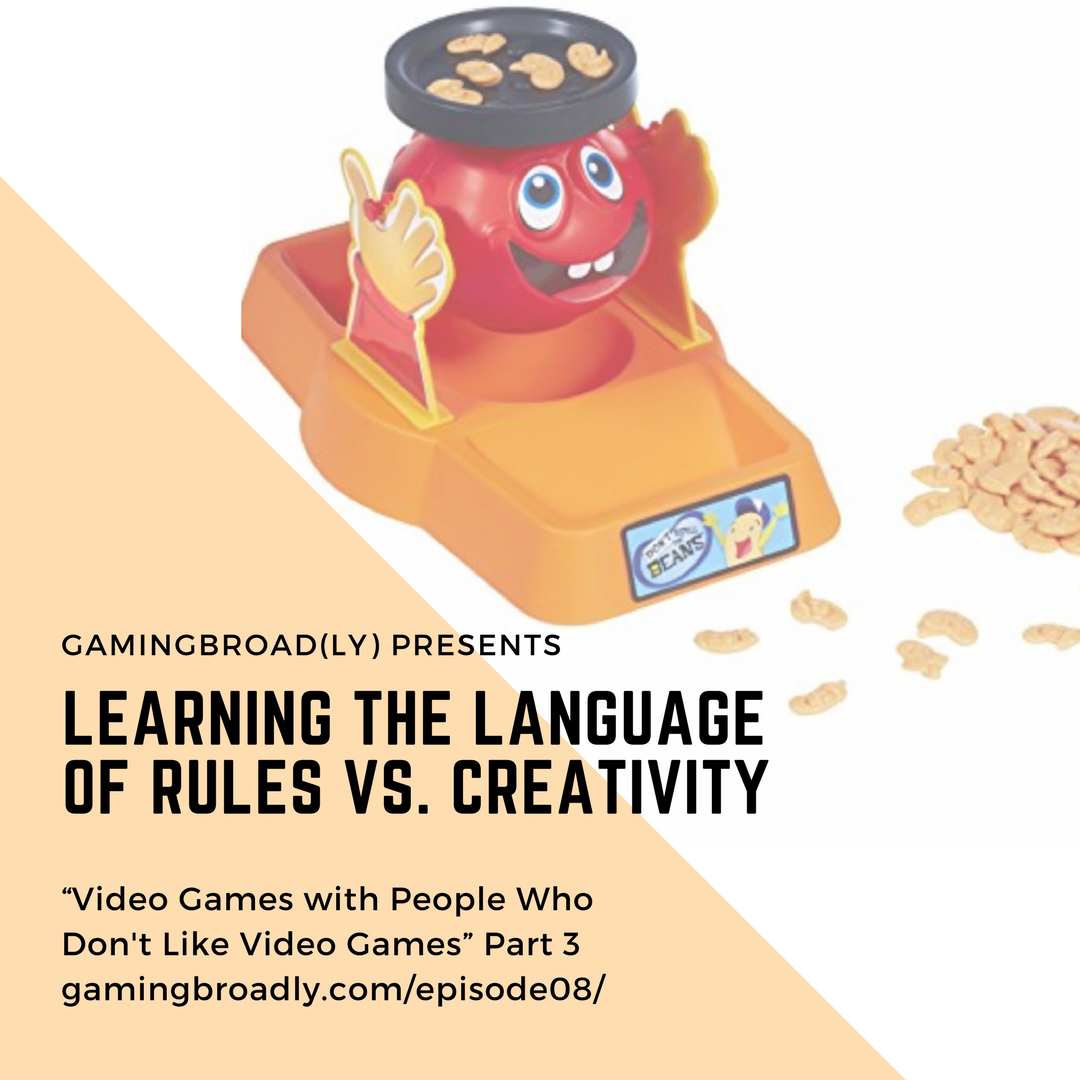
Wednesday Jul 12, 2017
Wednesday Jul 12, 2017
Join JD and Lisa P. for Episode 08 as we unpack the question of rules. When are rules in games fun? When are they a real snore-fest? What's the value of rules vs. creativity in play and language-learning? Lisa P. is a full-time public school teacher for the Deaf and Hard of Hearing finishing up her Master's in special education at the University of Northern Colorado. Lisa doesn't play video games, but loves to play regular old games (aka board games and tabletop games), and the differences between the two makes all the difference for her.
Growing up, Lisa did play a few computer games, but at the time didn't really think of them as video games. The games she played were mostly creative and open, not bound by what she thought of as the defining characteristics of video games: narrative and objectives. Not all games with rules throw her off though. A lover of people-to-people connections, Lisa does enjoy the deeply social nature of board games, rules and all. She uses that drive for conversation in her classroom, where she teaches young students about the world of words through gameplay. Rules play a part in the way she helps children learn about language. As it turns out, learning to communicate with other people isn't so different from learning the rules for how to play a game!
This is the third episode in a series of interviews about video games with people who don't like playing video games, inspired by Brie Code and a panel from SXSW (titled "Video Games for People Who Don't Like Video Games"). See Episode 06: Crying in a Closet, an interview with non-gamer Bailey Morrison about games and anxiety, for part one in the series, and Episode 07: The Pleasures of Back-seat Gaming with game spectator and eSports lover Nora Green, for part two.
Stuff we mentioned...
Wii Fit
Wii Sports
Barbie Fashion Designer
Barbie Magic Hair Styler
Beasts of Balance
Skylanders
Talk With Me Barbie
Rollercoaster Tycoon
Pokemon Snap
Monopoly
Codenames
Heads Up
Use and Pragmatics of Language
Don't Spill the Beans
Cootie Game
Tell Tale
The Sims
JD (The Broad)
Website: GamingBroadly.com
Twitter: @JayDeeCepticon
Instagram: @JayDeeCepticon
Lisa P. (The Cast)
Twitter: @PilgrimDeafEd
Gaming Broad(cast) is the official podcast of GamingBroadly.com. Thank you to everyone who has liked, subscribed, and commented about Gaming Broad(cast) on Apple Podcasts! You can also follow this podcast on Spotify, Podbean, Stitcher, Google Music, or subscribe directly using our RSS feed. Want some gamey goodness in your email inbox? Sign up for some occasional(ly) playful newsletter updates. Thanks to Los Kurados for the use of their song "Rojo Y Azul" for the intro and outro music of our podcast.

